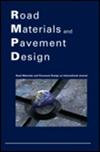Review of methodology for life cycle assessment and life cycle cost analysis of asphalt pavements
IF 3
3区 工程技术
Q2 CONSTRUCTION & BUILDING TECHNOLOGY
引用次数: 0
Abstract
AbstractDifferent approaches continue to be used to evaluate the environmental and financial impacts of road pavements throughout their life cycle. This paper aims to provide a methodological review of published studies of asphalt pavement Life Cycle Assessment (LCA) and Life Cycle Cost Analysis (LCCA) and make recommendations for future studies. The results indicate that LCA studies limitations are related to functional units (FUs), chosen life cycle phases, maintenance schedules decision, and uncertainty. In comparison, the use of LCCA is limited to assessing maintenance strategies, is largely focused on agency cost, and usually ignores the possibility of current or future uncertainty. Accordingly, it is recommended to incorporate both LCA and LCCA, define a standard set of FUs, include the complete life cycle (including for new materials), consider pavement performance predictions in determining realistic maintenance schedules, include both short- and long-term costs and environmental impacts, and emphasise on probabilistic analysis of uncertainty.KEYWORDS: Economic analysisenvironmental analysislife cycle assessmentlife cycle cost analysisasphalt pavement AcknowledgementsThe authors of this paper would like to express their gratitude to Diponegoro University for the support provided during the research conducted.Disclosure statementNo potential conflict of interest was reported by the author(s).Additional informationFundingThe study was sponsored and fully funded by the Diponegoro University [grant number 5172/UN7.P2/KP/2020].沥青路面生命周期评价与生命周期成本分析方法综述
摘要不同的方法继续被用于评估道路路面在其整个生命周期中的环境和财务影响。本文旨在对已发表的沥青路面生命周期评估(LCA)和生命周期成本分析(LCCA)研究进行方法学回顾,并为未来的研究提出建议。结果表明,LCA研究的局限性与功能单元(FUs)、选择的生命周期阶段、维护计划决策和不确定性有关。相比之下,LCCA的使用仅限于评估维护策略,主要关注代理成本,通常忽略当前或未来不确定性的可能性。因此,建议将LCA和LCCA结合起来,定义一套标准的FUs,包括完整的生命周期(包括新材料),在确定现实的维护计划时考虑路面性能预测,包括短期和长期成本和环境影响,并强调不确定性的概率分析。关键词:经济分析、环境分析、生命周期评价、生命周期成本分析、沥青路面致谢本文作者感谢迪波涅戈罗大学在研究过程中给予的支持。披露声明作者未报告潜在的利益冲突。该研究由Diponegoro大学赞助并全额资助[资助号5172/UN7.P2/KP/2020]。
本文章由计算机程序翻译,如有差异,请以英文原文为准。
求助全文
约1分钟内获得全文
求助全文
来源期刊

Road Materials and Pavement Design
工程技术-材料科学:综合
CiteScore
8.10
自引率
8.10%
发文量
105
审稿时长
3 months
期刊介绍:
The international journal Road Materials and Pavement Design welcomes contributions on mechanical, thermal, chemical and/or physical properties and characteristics of bitumens, additives, bituminous mixes, asphalt concrete, cement concrete, unbound granular materials, soils, geo-composites, new and innovative materials, as well as mix design, soil stabilization, and environmental aspects of handling and re-use of road materials.
The Journal also intends to offer a platform for the publication of research of immediate interest regarding design and modeling of pavement behavior and performance, structural evaluation, stress, strain and thermal characterization and/or calculation, vehicle/road interaction, climatic effects and numerical and analytical modeling. The different layers of the road, including the soil, are considered. Emerging topics, such as new sensing methods, machine learning, smart materials and smart city pavement infrastructure are also encouraged.
Contributions in the areas of airfield pavements and rail track infrastructures as well as new emerging modes of surface transportation are also welcome.
 求助内容:
求助内容: 应助结果提醒方式:
应助结果提醒方式:


